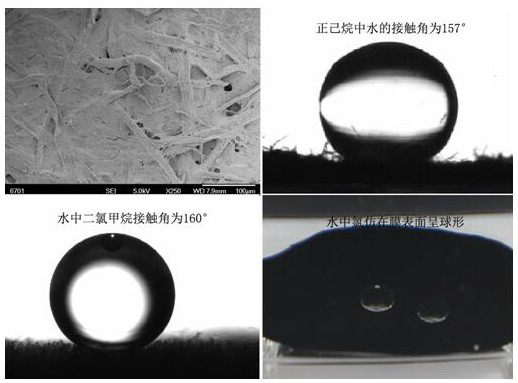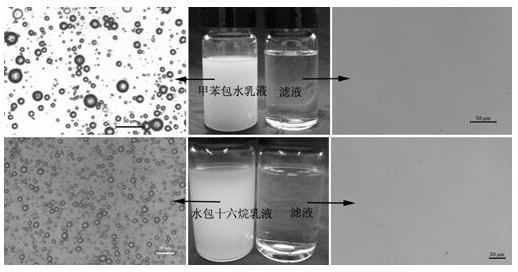An underwater super-oleophobic and sub-oil super-hydrophobic material for oil-water emulsion separation and a solvent-free preparation method thereof
An underwater super-oleophobic and super-hydrophobic technology, applied in separation methods, liquid separation, chemical instruments and methods, etc., can solve the problems of unsatisfactory application fields, poor material stability, complicated preparation process, etc., and achieve solvent resistance retention , The effect of less material usage and simple preparation process
- Summary
- Abstract
- Description
- Claims
- Application Information
AI Technical Summary
Problems solved by technology
Method used
Image
Examples
Embodiment 1
[0022] Silica 0.15g
[0023] FeCl 3 0.81 grams
[0024] Ethanol / water 7 / 14 mL
[0025] Soaking times 4 times
[0026] Drying temperature 50℃
[0027] Pyrrole monomer 0.08 mL
[0028] Vapor deposition time 6 h
[0029] Vapor deposition temperature 35°C
[0030] Weigh each component according to the ratio described in the present invention, first disperse the nano silicon dioxide in the solvent, the ultrasonic time is 10 min, and then the FeCl 3 Add to the above mixture and stir for 10 min to form a silica dispersion containing oxidant. Then soak the filter paper with a pore size of 1-3 microns in the above solution for 30 minutes, take it out, and dry it at 50°C, repeating this process 4 times. Finally, the treated filter paper is placed in a closed container containing pyrrole monomer for gas-phase polymerization, washed with deionized water and dried. The contact angle of dichloromethane in the obtained sample water is 160°, and the contact angle of water in n-hexan...
Embodiment 2
[0032] Silicon dioxide 0.20 g
[0033] FeCl 3 0.81 grams
[0034] Ethanol / water 7 / 14 mL
[0035] Soaking times 3 times
[0036] Drying temperature 50°C
[0037] Pyrrole monomer 0.10 mL
[0038] Vapor deposition time 4 h
[0039] Vapor deposition temperature 40 °C
[0040] Weigh each component according to the ratio described in the present invention, first disperse the nano silicon dioxide in the solvent, the ultrasonic time is 20 min, and then the FeCl 3 Add to the above mixture and stir for 10 min to form a silica dispersion containing oxidant. Then soak the filter paper with a pore size of 30-50 microns in the above solution for 20 min, take it out, and dry it at 50 °C, repeating this process 3 times. Finally, the treated filter paper is placed in a closed container containing pyrrole monomer for gas-phase polymerization, washed with deionized water and dried. The underwater toluene contact angle of the obtained sample was 163°, and the contact angle of water in n-h...
Embodiment 3
[0042] Silicon dioxide 0.60 g
[0043] FeCl 3 1.62 grams
[0044] Ethanol / water 30 / 60 mL
[0045] Soaking times 7 times
[0046] Drying temperature 50℃
[0047] Pyrrole monomer 0.15 mL
[0048] Vapor deposition time 6 h
[0049] Vapor deposition temperature 40°C
[0050] Weigh each component according to the ratio described in the present invention, first disperse the nano silicon dioxide in the solvent, the ultrasonic time is 30 min, and then the FeCl 3 Add to the above mixture and stir for 10 min to form a silica dispersion containing oxidant. Then soak the filter paper with a pore size of 30-50 microns in the above solution for 20 min, take it out, and dry it at 50 °C, repeating this process 7 times. Finally, the treated filter paper is placed in a closed container containing pyrrole monomer for gas-phase polymerization, washed with deionized water and dried. The underwater toluene contact angle of the obtained filter paper fiber membrane is 163°, and the contact ...
PUM
| Property | Measurement | Unit |
|---|---|---|
| separation | aaaaa | aaaaa |
| separation | aaaaa | aaaaa |
Abstract
Description
Claims
Application Information
 Login to View More
Login to View More - R&D
- Intellectual Property
- Life Sciences
- Materials
- Tech Scout
- Unparalleled Data Quality
- Higher Quality Content
- 60% Fewer Hallucinations
Browse by: Latest US Patents, China's latest patents, Technical Efficacy Thesaurus, Application Domain, Technology Topic, Popular Technical Reports.
© 2025 PatSnap. All rights reserved.Legal|Privacy policy|Modern Slavery Act Transparency Statement|Sitemap|About US| Contact US: help@patsnap.com


